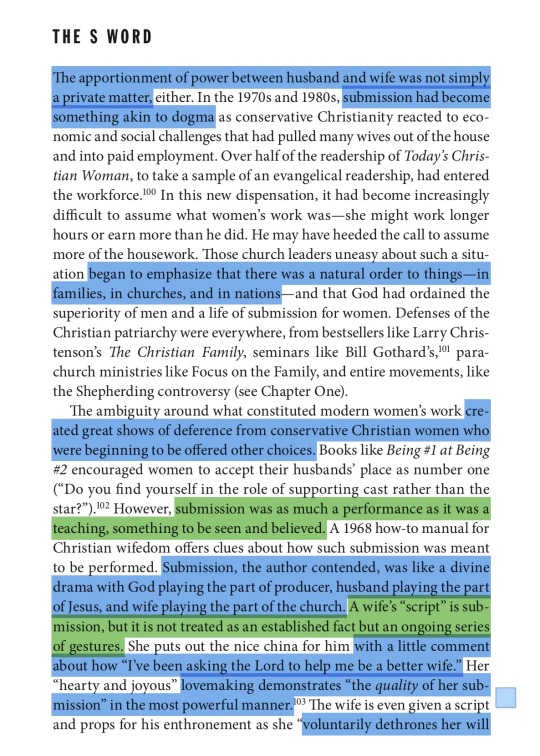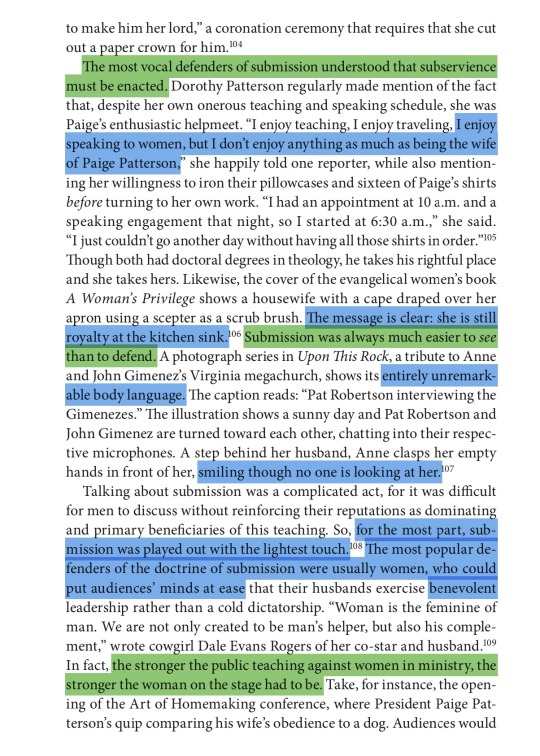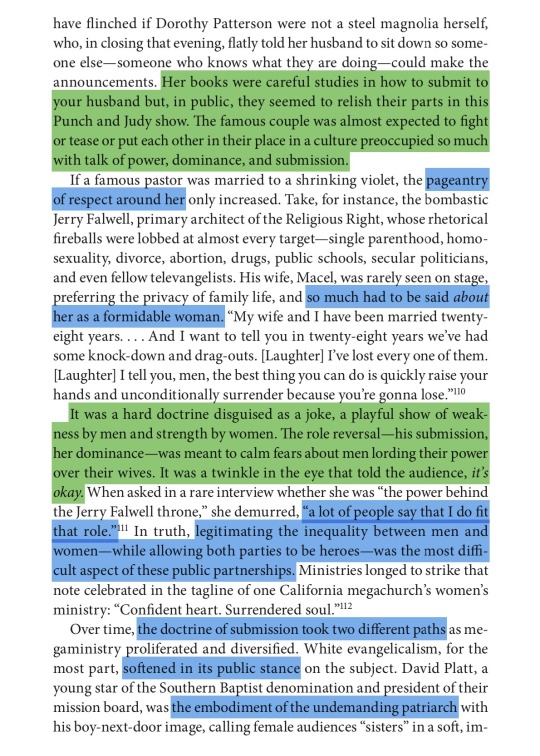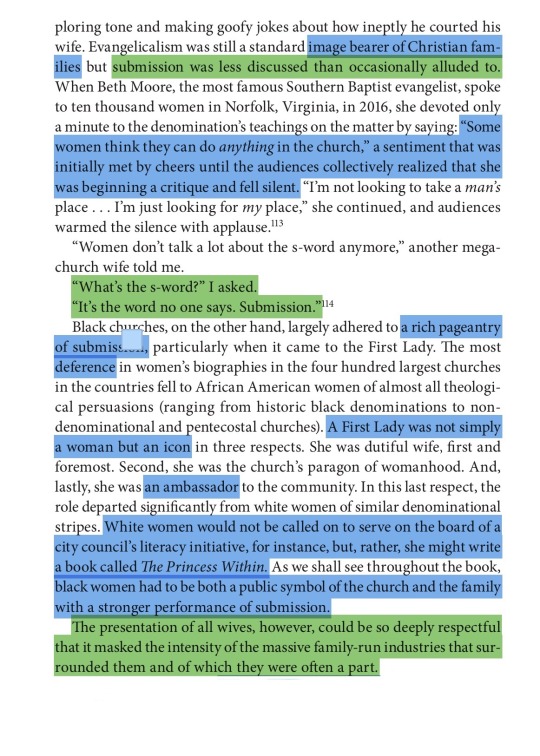#dorothy patterson
Explore tagged Tumblr posts
Text




“The S Word” – on the performance of Christian patriarchy & the word no one says
from The Preacher’s Wife: The Precarious Power of Evangelical Women Celebrities by Kate Bowler (2019)
transcript under the cut
The apportionment of power between husband and wife was not simply a private matter, either. In the 1970s and 1980s, submission had become something akin to dogma as conservative Christianity reacted to economic and social challenges that had pulled many wives out of the house and into paid employment. Over half of the readership of Today’s Christian Woman, to take a sample of an evangelical readership, had entered the workforce. In this new dispensation, it had become increasingly difficult to assume what women’s work was—she might work longer hours or earn more than he did. He may have heeded the call to assume more of the housework.
Those church leaders uneasy about such a situation began to emphasize that there was a natural order to things—in families, in churches, and in nations—and that God had ordained the superiority of men and a life of submission for women. Defenses of the Christian patriarchy were everywhere, from bestsellers like Larry Christenson’s The Christian Family, seminars like Bill Gothard’s, parachurch ministries like Focus on the Family, and entire movements, like the Shepherding controversy (see Chapter One).
The ambiguity around what constituted modern women’s work created great shows of deference from conservative Christian women who were beginning to be offered other choices. Books like Being #1 at Being #2 encouraged women to accept their husbands’ place as number one (“Do you find yourself in the role of supporting cast rather than the star?”). However, submission was as much a performance as it was a teaching, something to be seen and believed.
A 1968 how-to manual for Christian wifedom offers clues about how such submission was meant to be performed. Submission, the author contended, was like a divine drama with God playing the part of producer, husband playing the part of Jesus, and wife playing the part of the church. A wife’s “script” is submission, but it is not treated as an established fact but an ongoing series of gestures. She puts out the nice china for him with a little comment about how “I’ve been asking the Lord to help me be a better wife.” Her “hearty and joyous” lovemaking demonstrates “the quality of her submission” in the most powerful manner. The wife is even given a script and props for his enthronement as she “voluntarily dethrones her will to make him her lord,” a coronation ceremony that requires that she cut out a paper crown for him.
The most vocal defenders of submission understood that subservience must be enacted. Dorothy Patterson regularly made mention of the fact that, despite her own onerous teaching and speaking schedule, she was Paige’s enthusiastic helpmeet. “I enjoy teaching, I enjoy traveling, I enjoy speaking to women, but I don’t enjoy anything as much as being the wife of Paige Patterson,” she happily told one reporter, while also mentioning her willingness to iron their pillowcases and sixteen of Paige’s shirts before turning to her own work. “I had an appointment at 10 a.m. and a speaking engagement that night, so I started at 6:30 a.m.,” she said. “I just couldn’t go another day without having all those shirts in order.”
Though both had doctoral degrees in theology, he takes his rightful place and she takes hers. Likewise, the cover of the evangelical women’s book A Woman’s Privilege shows a housewife with a cape draped over her apron using a scepter as a scrub brush. The message is clear: she is still royalty at the kitchen sink.
Submission was always much easier to see than to defend. A photograph series in Upon This Rock, a tribute to Anne and John Gimenez’s Virginia megachurch, shows its entirely unremarkable body language. The caption reads: “Pat Robertson interviewing the Gimenezes.” The illustration shows a sunny day and Pat Robertson and John Gimenez are turned toward each other, chatting into their respective microphones. A step behind her husband, Anne clasps her empty hands in front of her, smiling though no one is looking at her.
Talking about submission was a complicated act, for it was difficult for men to discuss without reinforcing their reputations as dominating and primary beneficiaries of this teaching. So, for the most part, submission was played out with the lightest touch. The most popular defenders of the doctrine of submission were usually women, who could put audiences’ minds at ease that their husbands exercise benevolent leadership rather than a cold dictatorship. “Woman is the feminine of man. We are not only created to be man’s helper, but also his complement,” wrote cowgirl Dale Evans Rogers of her co-star and husband.
In fact, the stronger the public teaching against women in ministry, the stronger the woman on the stage had to be. Take, for instance, the opening of the Art of Homemaking conference, where President Paige Patterson’s quip comparing his wife’s obedience to a dog. Audiences would have flinched if Dorothy Patterson were not a steel magnolia herself, who, in closing that evening, flatly told her husband to sit down so someone else—someone who knows what they are doing—could make the announcements.
Her books were careful studies in how to submit to your husband but, in public, they seemed to relish their parts in this Punch and Judy show. The famous couple was almost expected to fight or tease or put each other in their place in a culture preoccupied so much with talk of power, dominance, and submission.
If a famous pastor was married to a shrinking violet, the pageantry of respect around her only increased. Take, for instance, the bombastic Jerry Falwell, primary architect of the Religious Right, whose rhetorical fireballs were lobbed at almost every target—single parenthood, homosexuality, divorce, abortion, drugs, public schools, secular politicians, and even fellow televangelists. His wife, Macel, was rarely seen on stage, preferring the privacy of family life, and so much had to be said about her as a formidable woman.
“My wife and I have been married twenty-eight years. . . . And I want to tell you in twenty-eight years we’ve had some knock-down and drag-outs. [Laughter] I’ve lost every one of them. [Laughter] I tell you, men, the best thing you can do is quickly raise your hands and unconditionally surrender because you’re gonna lose.”
It was a hard doctrine disguised as a joke, a playful show of weakness by men and strength by women. The role reversal—his submission, her dominance—was meant to calm fears about men lording their power over their wives. It was a twinkle in the eye that told the audience, it’s okay.
When asked in a rare interview whether she was “the power behind the Jerry Falwell throne,” she demurred, “a lot of people say that I do fit that role.” In truth, legitimating the inequality between men and women—while allowing both parties to be heroes—was the most difficult aspect of these public partnerships. Ministries longed to strike that note celebrated in the tagline of one California megachurch’s women’s ministry: “Confident heart. Surrendered soul.”
Over time, the doctrine of submission took two different paths as megaministry proliferated and diversified. White evangelicalism, for the most part, softened in its public stance on the subject. David Platt, a young star of the Southern Baptist denomination and president of their mission board, was the embodiment of the undemanding patriarch with his boy-next-door image, calling female audiences “sisters” in a soft, imploring tone and making goofy jokes about how ineptly he courted his wife.
Evangelicalism was still a standard image bearer of Christian families but submission was less discussed than occasionally alluded to. When Beth Moore, the most famous Southern Baptist evangelist, spoke to ten thousand women in Norfolk, Virginia, in 2016, she devoted only a minute to the denomination’s teachings on the matter by saying: “Some women think they can do anything in the church,” a sentiment that was initially met by cheers until the audiences collectively realized that she was beginning a critique and fell silent. “I’m not looking to take a man’s place . . . I’m just looking for my place,” she continued, and audiences warmed the silence with applause.
“Women don’t talk a lot about the s-word anymore,” another megachurch wife told me.
“What’s the s-word?” I asked.
“It’s the word no one says. Submission.”
Black churches, on the other hand, largely adhered to a rich pageantry of submission, particularly when it came to the First Lady. The most deference in women’s biographies in the four hundred largest churches in the countries fell to African American women of almost all theological persuasions (ranging from historic black denominations to non-denominational and pentecostal churches).
A First Lady was not simply a woman but an icon in three respects. She was dutiful wife, first and foremost. Second, she was the church’s paragon of womanhood. And, lastly, she was an ambassador to the community. In this last respect, the role departed significantly from white women of similar denominational stripes. White women would not be called on to serve on the board of a city council’s literacy initiative, for instance, but, rather, she might write a book called The Princess Within. As we shall see throughout the book, black women had to be both a public symbol of the church and the family with a stronger performance of submission.
The presentation of all wives, however, could be so deeply respectful that it masked the intensity of the massive family-run industries that surrounded them and of which they were often a part.
#kate bowler#quotes#christian patriarchy#headship#exvangelical#christian history#dorothy patterson#jerry falwell#paige patterson#patriarchy#misogyny#misogynoir#image described#the preacher’s wife#mac’s bookshelf#christianity tw#❌ian patriarchy
19 notes
·
View notes
Text




LIFE, December 1, 1927
#life magazine#1920s humor#dorothy parker#gluyas williams#russell patterson#christmas#santa claus#plum pudding#flappers#1920s#1927
36 notes
·
View notes
Text
Closed Starter: @eclvpses at hospital
Analysis all done and sent to the lab, Dilara finished checking baby Fraser’s vitals. Delivering babies over the years had turned into one of the best feelings that she had ever felt. Whether it was the unavoidable emotional moment right before the head first popped out and a new life entered the world, or the fact that babies were so pure and untainted from the moment they’re born, amongst a thousand or so other options, she couldn’t really figure out the reasoning. All she knew was how easy it was to become attached if you weren’t careful, and over the years it only adds up. Having had the nurses take care of the analysis and the basic check ups, Dilara could focus on chatting up with Dottie which was honestly one of her favorite part of the job along with playing with Fraser. She reached for the baby, holding him up on the examining table as she bounced him on his feet. “How has he been doing with feedings? Are we eating better now?”


2 notes
·
View notes
Text
fright fest w/ @eclvpses
Kai sits down at the bar, turning his head to nod at the person pushing his drink toward him. He reaches down and plucks it off the table, raising it up to his lips and taking a long sip of it. His attention shifts to the stool next to him as a dark-haired woman struggles to get on it. He notices she's about to slip, his hands reach out and grab a hold of her hips, a low chuckle leaving his lips. "You good?"

2 notes
·
View notes
Text
Closed Starter:@eclvpses
Bash was just aimlessly playing through the games, not really giving any of it any real attention. Soon enough he'd gathered a bit of a crowd as he kept popping balloons off without missing. It was making him a bit anxious so he quickly rid of the last darts winning a large teddy bear in the process. "Uh - thanks." he said awkwardly to the person who handed to him before turning towards Dottie. "Would you like a stuffed bear?"

4 notes
·
View notes
Text
( @eclvpses )
"You look so cute!" Myria practically squealed upon approaching Dottie - clasping her hands in theirs; it wasn't the costume, really - Myria always thought Dottie looked cute. Like a little dress up doll - one that she just wanted to pinch the cheeks of, and eat all up. Like a little sister, really. "Have you been on the hayride yet? I heard that there's these, like - chainsaw guys who start chasing you on foot, and like - climbing out of the corn and everything - it sounds really fun, right?"

#––– ❛ myria saengkaew 【 little blurry stars scattered all across / interactions. 】#––– ❛ myria saengkaew 【 featuring dorothy patterson. 】#i dont think we hv a connect for them so im godmodding this (lovingly)
3 notes
·
View notes
Text

Bad movie I have An Affair to Remember 1957
#An Affair to Remember#Cary Grant#Deborah Kerr#Richard Denning#Neva Patterson#Cathleen Nesbitt#Robert Q. Lewis#Charles Watts#Fortunio Bonanova#Dorothy Adams#Richard Allen#Al Bain#Frank Baker#Mary Bayless#Dino Bolognese#Paul Bradley#George Calliga#Mary Carroll#Steve Carruthers#Norman Champion III#Kathleen Charney#Brian Corcoran#Walt Davis#Anthony De Mario#Ken DuMain#Minta Durfee#Michka Egan#Suzanne Ellers#Juney Ellis
4 notes
·
View notes
Text

Dorothy et Neva Patterson
0 notes
Text
Kai laughs. "Superman and Batman are overrated... but of course that's between us." He winks at her as he drifts his gaze across her features. She's so fucking beautiful he wonders if she even knows it. He nods his head at her question, knowing he wouldn't take the compliment back to save his life. He also knows he should be more careful with a girl like her, knowing he was no where near ready to jump into something else. Not when Bella still owned his entire heart. "It's cute," he says, leaning in and pressing his lips against her cheek. "Pink looks good on you."

@eclvpses
“Yeah, obviously. Don’t tell anyone I said this because I feel like people will be - just, overly pissed, but I always thought Superman is overrated. You’re not though. You’re cool.” Dottie was just about over the moon at his compliment - she tried to hide it, but she wore her heart on her sleeve. A megawatt smile emerged that caused her cheeks to already begin to ache. “You think so?” She asked, both about his kind words and the power couple comment. “About - like, being a power couple even better than Superman and Lois. Big shoes to fill! But thank you for being kind as well. I think I’m blushing a lot, I feel silly.”

28 notes
·
View notes
Text

Best Short Stories by Negro Writers: An Anthology from 1899 to the Present, Edited and with an Introduction by Langston Hughes, Little, Brown and Company, Boston, MA, 1967

Feat.: Alston Anderson, James Baldwin, Lebert Bethune, Robert Boles, Arna Bontemps, Gwendolyn Brooks, Frank London Brown, Charles W. Chesnutt, Alice Childress, John Henry Clarke, Cyrus Colter, Pearl Crayton, Owen Dodson, Paul Laurence Dunbar, Katherine Dunham, Junius Edwards, Ralph Ellison, Ronald Fair, Rudolph Fisher, Ernest J. Gaines, Chester B. Himes, Langston Hughes, Kristin Hunter, Zora Neale Hurston, Clifford Vincent Johnson, William Melvin Kelley, John Oliver Killens, Woodie King, Jr., Sylvester Leaks, Paule Marshall, R. J. Meaddough III, Ronald Milner, Willard Motley, Lindsay Patterson, Ted Poston, Conrad Kent Rivers, Charlie Russell, Mike Thelwell, Jean Toomer, Mary Elizabeth Vroman, Alice Walker, Eric Walrond, Dorothy West, John A. Williams, Charles Wright, Richard Wright, Frank Yerby
Plus: Anthologies of African American Writing, Mason Libraries Omeka Portal, George Mason University, Fairfax, VA
#graphic design#typography#book#cover#book cover#langston hughes#little brown and company#anthologies of african american writing#mason libraries omeka portal#1960s
16 notes
·
View notes
Text

Clark Gable and Jean Harlow in Hold Your Man (Sam Wood, 1933)
Cast: Clark Gable, Jean Harlow, Stuart Erwin, Dorothy Burgess, Muriel Kirkland, Garry Owen, Barbara Barondess, Elizabeth Patterson, Blanche Friderici, Theresa Harris, George Reed. Screenplay: Anita Loos, Howard Emmett Rogers. Cinematography: Harold Rosson. Art direction: Merrill Pye. Film editing: Frank Sullivan.
Part sexy pre-Code romp and part weepie melodrama, Hold Your Man succeeds on both counts. Clark Gable plays small-time con man Eddie Hall, who while fleeing from the cops winds up in the apartment of Ruby Adams (Jean Harlow), while she's taking a bath. He winds up there for good until he slugs an intruder into her apartment, accidentally killing him. He takes it on the lam and she takes the rap, going to a women's prison where she learns that she's carrying his child. The denouement, in which Ruby's fellow inmates help unite her with Eddie, is full of suspense. In a surprisingly almost enlightened twist, the heroine of this section of the movie is a Black prisoner, Lily Mae (Theresa Harris), whose father, a minister (George Reed), just happens to be at the prison for visitors' day, and thus available with a little maneuvering to marry Ruby and Eddie. (I say "almost enlightened" because neither Harris nor Reed gets a screen credit, and an alternate ending was filmed for Southern release, in which the minister was played by Henry B. Walthall.) The switch from hijinks among lowlifes to redemptive love story is a little jarring, but Harlow was never more in her element, and Gable's smirky charm is engaging.
11 notes
·
View notes
Text

from The Preacher’s Wife: The Precarious Power of Evangelical Women Celebrities by Kate Bowler (2019)
[…] for its defining issues. Mrs. Patterson, as she liked to be called, was still a model of extravagant deference to her husband: she was billed as a “homemaker” despite her doctoral degree, was almost always seen in wide church hats that she wore as a symbol of her living “under the authority” of her husband, and was a fixture in the front row, where she declined to introduce even her own Art of Homemaking conference in the presence of men.
Paige Patterson did the honors. He paced the stage beforehand, giving commands in a deep drawl to the duck-tolling retriever he brought as a nod to the love of hunting shared between himself and the evening’s honored speakers from the hit A&E show Duck Dynasty. It also served as a punch line to his joke that his dog, not his wife, had already learned to obey him.
It was well known that Paige Patterson kept among his trophies of safari animals a stuffed baboon posed reading Darwin’s Origin of the Species, a perfect symbol of his stance as a heresy hunter on matters of scriptural inerrancy, creationism, and complementarianism. To the Pattersons and many others, the authority of men over women was a matter of sound doctrine rooted in scripture. For as the Apostle Paul wrote in Ephesians 5: “Wives, submit to your own husbands as you do to the Lord. For the husband is the head of the wife as Christ is the head of the church, his body, of which he is the Savior.”
But theological arguments for women in the home were perhaps better seen in every detail of Dorothy’s handiwork. Her conference was designed to be the model of old-fashioned Southern hospitality, where homemaking was a deliberately political and theological act. From the breakout sessions called “The Heart of the Christian Hostess” to the linen and floral centerpieces on elaborately set tables where women could sip oolong tea with the editor of Tea Time magazine, all was done in the interest of teaching a woman how to be a lady.
She could also learn to be a Christian voice in the political arena. Speakers reminded audiences familiar with the names of Simone de Beauvoir and Betty Friedan that they lived in a counter-Christian world confused about the proper roles for men and women. In the makeshift marketplace in the lobby, women sold homemade crafts, jewelry, and jams to bolster their stay-at-home income and got brochures from the Concerned Women for America about how to lobby from their kitchen tables. And while many of the attendees’ long homemade skirts would have seemed a bit dated in the wider world of […]
#evangelical#exvangelical#headship#christian patriarchy#gender roles#dorothy patterson#paige patterson#art of homemaking#image described#quotes#mac’s bookshelf#❌ian patriarchy#patriarchy#misogyny
3 notes
·
View notes
Text

Tethered - An Imodna/Critical Role WLW Fanmix
1. DDRMR - Vegeta Hell's Bells Theme // 2. Halsey - Bells in Santa Fe // 3. Brandi Carlile - Raise Hell // 4. Tamberlin - possessed // 5. Esmé Patterson - No River // 6. L7 - Moonshine // 7. Twin Tribes - Shadows // 8. Stevie Nicks - Sorcerer // 9. girl in red - dead girl in the pool. // 10. Julia Sheer - Give Your Heart a Break // 11. Nervus - Sick Sad World // 12. Laura Jane Grace - SuperNatural Possession // 13. Amaris - Undead // 14. Haroula Rose - Lavender Moon // 15. Jenny Owen Youngs - Your Apartment // 16. Anya Marina - Tethered to the Dark // 17. Hozier - NFWMB // 18. The Civil Wars - Dust to Dust // 19. salvia palth - (dream) // 20. Lana Del Rey - Season of the Witch // 21. Dorothy - Raise Hell // 22. She Wants Revenge - A Hundred Kisses // 23. The Naked and Famous - Bells // 24. Daughter - All I Wanted // 25. Dream, Ivory - Dream, Ivory // 26. DDRMR, Kelsey Luo - Lullabies // 27. In Love With a Ghost - I Was Feeling Down, I Found a Nice Witch and We're Friends // 28. Rasputina - Bad Moon Rising // 29. Alice Phoebe Lou - Witches // 30. Tanner Adell - Strawberry Crush // 31. Lebanon Hanover - Kiss Me Until My Lips Fall Off // 32. Turnover - Like Slow Disappearing // 33. Jenny Owen Youngs - Teenage Dream // 34. Wolf Girl - Dream Partner // 35. MARINA - Immortal // 36. Adna - Beautiful Hell // 37. The xx - Together // 38. Emily Jane White - Hands // 39. Dead Man's Bones - My Body's a Zombie For You // 40. Adna - Dreamer // 41. Sarah McLachlan - Possession // 42. Against Me! - Two Coffins // 43. Nick Drake - Pink Moon // 44. Starbenders - BITCHES BE WITCHES // 45. MisterWives - Dreams // 46. Yuna - Lullabies (Adventure Club Remix) // 47. Turnover - Disintegration // 48. girl in red - we fell in love in october // 49. Mother Mother - Arms Tonite // 50. Mareux - The Perfect Girl // 51. Lana Del Rey - Born To Die (Woodkid & The Shoes Remix) // 52. Nightcomber, Jenny Owen Youngs - Witchcraft // 53. vivi rincon - if we lived on the moon //
#critical role#imodna#bells hells#imogen x laudna#laudna#imogen temult#wlw#spotify#critical role fanmix#fanmix#my fanmix#my coverart#cr fanmix#yeah i know it's super fucking long my bad#bell's hells
21 notes
·
View notes
Text
Black History Month:Day 07

I drew Dorothy Lee Bolden-She was born on October 13th in 1924.In Atlanta,Georgia.Her parents were Georgia Mae Patterson (who was a housekeeper) and Raymond Bolden(who was a chauffer).When she was 9 she would help her mom out with housekeeping and would see how awful and unfair it was (they worked for $1.25 a week). And her early experience as a maid in late 1940s inspired her civil rights activism,she was arrested and taken to county jail after her white employer demanded her to wash dishes even though Dorothy's work hours were over and of course Dorothy refused,after she was taken to county jail to get psychiatric evaluation because she was seen as this "crazy lady" because she disobeyed orders from the white person,she was never institutionalized luckily but still that is just cruel...and that inspired her to start an organization to protect maids.In 1964.She organized a boycott of Atlanta schools to protest the school board’s reluctance to improve the quality of education for African American students,and in mid 1960s.She worked with Dr.Martin Luther King and other civil rights leaders to confront police brutality,especially in her Atlanta neighborhood,Vine City.In 1968 she found an organization 'National Domestic Workers Union of America' (NDWUA).Her motivation for NDWUA came from her bus rides.She would use public transportation to connect with other domestic workers,listening to their stories of low wages,their long hours,their long commutes horrible working conditions.Realizing their common and same experiences,Dorothy began to mobilize these workers. In the summer of 1968, hundreds of female domestic workers gathered in Atlanta to form the NDWUA with Dorothy as its first president in September of that same year.The NDWUA quickly enrolled thousands of domestic workers across 10 cities in the U.S.Through most of the 1960s.The national minimum wage was $1.25 an hour with black maids earning an average of $3.50 to $5.00 a day for twelve-to-fourteen hour shifts.The NDWUA demanded higher wages and within two years of the organization's founding Atlanta maids earned an average of $13.50 to $15.00 a day.The NDWUA also made sure domestic workers benefited from social security and workers compensation.As working conditions would improve she taught maids how to negotiate with their employers or to find alternate employment if negotiations were unsuccessful.Thousands of women around the country utilized the NDWUA’s job placement programs and learned of their workplace rights.Dorothy also understood the power of the ballot and made registration and voting a requirement for the members of the NDWUA.She became a very influential political leader in the 1970s.She was appointed to President Richard Nixon’s advisory committee on social services and welfare,she would later consult with Presidents Gerald Ford and Jimmy Carter on workers’ rights.Dorothy's time and advocacy became divided between Atlanta’s community efforts and national politics as conditions for domestic workers across the country continued to would improve year by year.But she also had to use her own money to carry out NDWUA programs during the 1980s.And because federal funding did not suffice the organization stopped operations in 1996.But she still continued to work in the social services sector.
She died on July 14th in 2005.In Atlanta,Georgia at the age of 80.
Her famous quotes was 'I don’t want to be out here pushing for you and you not registered to vote.We aren’t Aunt Jemima women and I sure to God don’t want people to think we are.We are politically strong and independent.' (Aunt Jemima was a racial stereotype and it was in the now Pearl Milling Company's name and products before they changed it)
Credits for information: blackpast.org
Materials used:Soft pastel crayons, HB pencil,8B pencil and a marker
See you soon everyone! 💖💖💖
#black history month 2025#black history month#black history#black lives matter#equal rights#dorothy lee bolden
2 notes
·
View notes
Text
fright fest w/ @eclvpses
Mateo bumps into someone. He's a few drinks in, okay, maybe a little more than a few and for some reason he hadn't even seen her coming since his gaze was focusing on the crowd in hopes to run into Brooklyn. He clears his throat, parting his lips to apologize when he recognizes her. "Hey... Still climbing ladders?"

4 notes
·
View notes
Text
Closed Starter:@eclvpses
"I wasn't getting ahead on the taco truck, but...I found us some deep fried oreos." Dante sang as he made her way back towards Dorothy after having had left her waiting while he cut ahead in line to get some food. "You won't believe how amazing they are. Here." He grabbed an oreo and held it up to her mouth while he grinned. "Have a taste."

3 notes
·
View notes